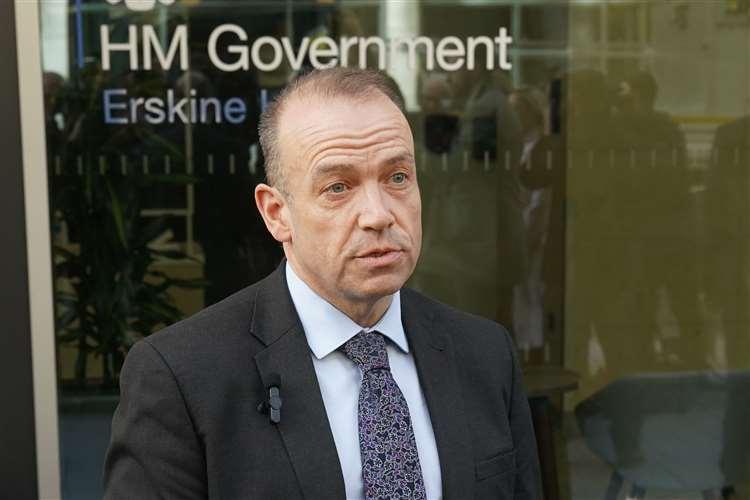The election that wasnít
British pressure on unionism proves half-hearted
2 November 2022

Northern Ireland Secretary Chris Heaton-Harris.
Chris Heaton-Harris, the British Northern Ireland Secretary, having indicated that he would call an assembly election immediately after midnight on Friday 27th of October, has now suspended the Northern Assembly without setting any date for the new election.
The sudden U-turn indicates the continued chaos and confusion in the latest iteration of Brexit Britain.
Nothing is as it seems. The public discussion is of the Northern Ireland Protocol. Westminster assures the Democratic Unionist Party (DUP) that they can be trusted to negotiate a hard-line deal. The DUP say that they cannot return and set in motion the mechanism to restore the local Assembly until the issue of the Northern Ireland Protocol is resolved.
In reality, from the Tory perspective, concern about the protocol which they drew up themselves, is simply a cover for strong-arming Europe. If they accept the compromise of a less visible protocol then putting the squeeze on the Democratic Unionist Party to claim victory and return to a power sharing administration will follow.
However, both projects are riddled with contradictions. On the one hand, Rishi Sunak is the representative of the banks. A settlement with Europe would promote financial stability. On the other hand, Sunak is a hard-line Brexiteer leading a far right cabinet. The banks will not care about policy on Europe as long as the tax and austerity plans balance the books.
The easiest path for the Tories is to continue with their bill tearing up the withdrawal agreement. This will buy time as it winds its way through the House of Lords and will preserve party unity, but the context will be heightened class struggle as wages are constrained and public services collapse.
However, the Irish question is not as simple as the Tories think. Everyone in the north of Ireland understands the issue for unionism. The North is benefiting from the protocol and most unionist economic objections are fake news. The major block to DUP participation is a fragmentation of the unionist vote. A significant section of unionism has rejected the whole idea of sharing government with Nationalists. This has led to a fall in the DUP vote. The DUP can only return to government if they can demonstrate a major political victory, force unionist unity and make a presence in the Assembly palatable by holding the First Ministerís title. The end of unionist fragmentation and the restoration of Stormont in its current form is highly unlikely.
The fact is that unionist
unity drives have always turned around recruiting loyalist paramilitaries.
True to form, there have been a number of under-reported bomb attacks followed
by a statement from the Loyalist Communities Council warning that loyalist
groups will resume campaigns if there is any compromise on the removal
of the Northern Ireland protocol. The same sources reported that only immediate
British rejection of joint authority avoided a bomb attack in the Southern
state. Anyone discounting this should be aware of how readily unionism
and the British themselves have been to use loyalist violence to strengthen
their case.
The British squeeze on the DUP is forced partly by pressure from the Biden government, heavily invested in promoting peace processes around the globe and looking to toast the success of the Good Friday Agreement at its 25th anniversary. It is also the case that Brexit comes first and there is a growing impatience with the Unionists.
The squeeze on the DUP followed a routine. Tough talk. Deadlines. Yet again a further slow-motion step on extending abortion services and another slow-motion step on the Ulster-Scots/Irish language act. The message could not be clearer. In government the Unionists would once again be able to sabotage further progress.
Unfortunately, the one goad that might have galvanised the Unionists, put forward by Taoiseach Micheál Martin, the threat of a joint authority of London and Dublin taking over the administration of the North, was briskly rejected by the British.
The sectarian colonial Assembly established at Stormont has failed and even fervent supporters such as the Taoiseach are beginning to admit this. If the 2023 election replicates the current electoral result then the British will have, yet again, to rejig the agreement to try to increase stability.
But there are certain lessons from the current debacle.
The narrative, supported by both the nationalist parties and the trade union leadership, is that we must: "get Stormont working". Yet Stormont hasn't worked in the past and there are no indications that it will work in the future.
One argument is that local politicians will bring progress, but the two longstanding issues of abortion and a commissioner for the Irish language are slowly being moved forward by Westminster, not Stormont.
The economic demand around getting Stormont working was about unlocking around £300 million in unspent funds, a fraction of what was needed. With Stormont gone will the unions finally ignore the Stormont monkey and campaign against the British organ grinder?
Another myth pushed by Sinn Fein is that we are on the verge of a successful border poll and a United Ireland. The British dismissal of joint administration with Dublin gives the lie to this.
As with many other issues, the decay of both the Brexit project and of the programme of unionist domination is evident. What is more problematic is the determination of Sinn Fein, the unions and the left to cling to the sinking ship of the Good Friday Agreement.